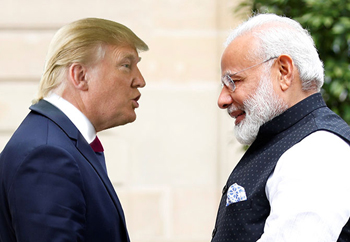Washington, Jun 24: Ahead of Prime Minister Narendra Modi's much-awaited United States of America visit, the Trump administration has rejected reports that it has been ignoring India.
Talking to reporters, a senior administration official said: "I think that it would be wrong to say that this administration has been ignoring or not focused on India."
"I think that the US really appreciates India, and I think that President Trump realises that India has been a force for good in the world and that it's a relationship that's important. And I think that will come through in the visit on Monday," the official added.
The PM arrives in the US on Sunday and is scheduled to meet President Donald Trump face-to-face for the first time at the White House on Monday.
The senior administration official made the remarks while responding to questions on whether the US-India relationship has drifted under the new government, in part, because of President Trump and the administration's support to China.
"I think it's a bit unfair. I mean, we're only six months into the administration. But there have been two very good phone calls between President Trump and Prime Minister Modi that you can point to as showing both countries' interest in the relationship," the White House official argued.
"Yes, this will be the first opportunity for them to sit down and have a conversation, but I think that this is still fairly early on in the administration," the official said.
Meanwhile, White House Press Secretary Sean Spicer said President Trump and Prime Minister Modi would have a very robust discussion when they meet at the White House.
"During the meeting, the President and the Prime Minister will discuss ongoing cooperation, including counter-terrorism, defence partnership in the Indo-Pacific region, global cooperation, burden-sharing, trade, law enforcement, and energy," Spicer said in response to a question.
Senator Mark Warner, Co-Chair of the Senate India Caucus hoped that Trump, in his meeting with Prime Minister Modi, shows enthusiastic support for deepening the US-India relationship, which enjoys strong bipartisan support.
"The relationship is ripe for additional cooperation in areas such as the development of aircraft carrier technology, space surveillance, unmanned aerial vehicles, cyber and increased defense manufacturing," Warner said.
"As we venture further into the Asian Century, there is little doubt of the increasing significance of India on the world stage. Our cooperation helps increase global security and advance economic opportunity in both countries," Warner said in response to a question.
On whether the contentious H-1B visa issue would come up for discussion during the meeting, a senior administration official said it was unlikely to be raised from the US side but if raised by the Indian side, the Americans were ready for it.
Ahead of the visit, Indian Ambassador to the US Navtej Sarna said the first face-to-face meeting between Prime Minister Modi and President Trump will give them an opportunity to look at the entire gamut of Indo-US engagement and to exchange views on issues of global interest.
At the invitation of Trump, the Prime Minister would spend several hours with the US President at the White House on Monday afternoon, which would end with a dinner later that night.
This would be the first working dinner being hosted by Trump for a foreign leader at the White House.
"I think that just shows the amount of care that has gone in on the part of the White House to welcome our Prime Minister and the kind of planning that has gone into make this a very special visit," Sarna said.
"This (dinner) is a special gesture and it is appreciated," he said.
On the agenda of the meeting, a senior administration official told reporters that the civil nuclear deal would be part of the discussions between Prime Minister Modi and President Trump.
The White House also emphasised that the US was looking forward to its nuclear reactors contributing to India's energy security.
It said the US is interested in providing India with the kind of defence technology it normally reserves for its closest allies, signalling the Trump administration's resolve to strengthen the bilateral defence relationship.
Meanwhile, Secretary of State Rex Tillerson met Foreign Secretary S Jaishankar here and told him that Prime Minister Modi's Washington visit would strengthen the Indo-US relationship and help advance the common interest in fighting terrorism and promoting economic growth.
The two agreed that the two countries have a deep and growing strategic partnership and hope to work more closely on regional and global issues.
Jaishankar also met other senior officials at the State Department.
Ahead of his visit, Prime Minister Modi on Friday said he will hold in-depth discussions with President Trump during his visit to Washington and hoped to build a forward-looking vision for a partnership with the new administration.
The Prime Minister said the visits were aimed at enhancing bilateral engagement in various areas.
He said India's partnership with the United States is multi-layered and diverse, supported by not just governments but all the stakeholders on both sides.
"I look forward to building a forward-looking vision for our partnership with the new administration in the United States under President Trump," Modi said.
"I look forward to this opportunity to have an in-depth exchange of views on further consolidating the robust and wide-ranging partnership between India and the United States," he said.





Comments
Add new comment